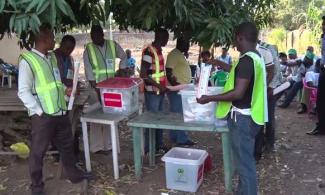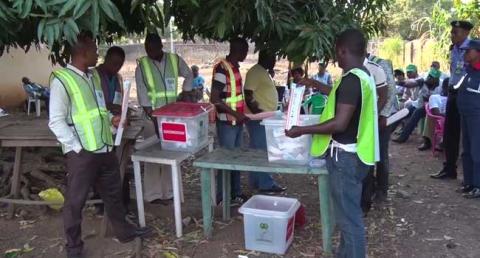
The scheduled trial of three indicted officials of the Independent National Electoral Commission (INEC) could not go on because of the prosecution. Lead prosecutors at the Economic and Financial Crimes Commission (EFCC), failed to produce its witness for trial to continue.
The scheduled trial of three indicted officials of the Independent National Electoral Commission (INEC) could not go on because of the prosecution. Lead prosecutors at the Economic and Financial Crimes Commission (EFCC), failed to produce its witness for trial to continue.
Rotimi Oyedepo, counsel to EFCC, informed the court that his witness is “unavoidably absent”, therefore asked that the case is adjourned till Monday, January 15, 2018.
The defense counsel did not oppose the motion for adjournment.
Consequently, Justice Muhammed Idris, the presiding judge, adjourned the case till Monday for the continuation of trial.
At the last adjourned sitting, the court admitted into evidence three confessional statements of Mr. Christian Nwosu, one of the defendants who confessed to having received N30 million from the N23 billion Diezani’s largess.
Mr. Nwosu, alongside two other INEC officials, Yisa Olanrewaju Adedoyin and Tijani Bashir, were re-arraigned on May 3, 2017, on an amended six-count charge bordering on receiving gratification to the tune of N264,880,000.00.
On November 28, 2017, when EFCC first sought to tender the statements, Mr. Nwosu told the court that the three statements he made to the Commission on December 28, 2016, and March 15 and 22, 2017 were not offered voluntarily.
His counsel, Mr. Obinna Okereke had told the court that his client was threatened and cajoled to make the statements.
“Justice requires that the interest of the accused should be taken into consideration and it does not lie in the power of prosecution to dictate how the trial of the defendant should go. The court should ensure that justice is done."
“The prosecution did not allow the defendant to have access to any legal practitioners when he was writing his confessional statement. The prosecution imposed a counsel on him."
“The ACJA, 2015, Section 29(2) & (3) of Evidence Act clearly states the guideline for taking the confessional statement from a defendant. But the prosecution did not comply with it; rather, the prosecution forcefully extracted and coercively obtained all statements of December 28, 2016, March 15, 2017 and March 22, 2017 from him,” he had said.
However, Mr. Oyedepo argued contrarily and urged the court to dismiss the claim by the defense, adding that two witnesses had already been called since the trial began.
Oyedepo, who moved his address orally, further said: “The defendant was duly cautioned when he was making his statement, and he signed the cautionary word when he was making his statement.”
Justice Idris, however, ruled in favor of EFCC, holding that the application filed by counsel to Mr. Nwosu lacked merit.
The judge, therefore, admitted the statements in evidence as exhibits D1 to D3 on December 4, 2017.
Mr. Nwosu, had pleaded guilty to receiving the sum of N30 million out of the alleged N23 billion Diezani Alison-Madueke bribe meant to compromise electoral officers before the 2015 general election when they were initially arraigned on April 5, 2017.
Justice Idris had earlier found Mr. Nwosu guilty and convicted him. He had also ordered forfeiture of all the landed properties acquired by Mr. Nwosu with the alleged proceeds of crime, including the sum of N5m (five million naira) found in his bank account.
Though Mr. Nwosu later entered into a plea bargain agreement with the EFCC, terms which the judge rejected on the grounds that Mr. Nwosu’s offense was heavier than the plea bargain agreement.
In view of this, Mr. Nwosu and other accused persons were re-arraigned on May 3, 2017, on an amended six-count charge by the EFCC.
